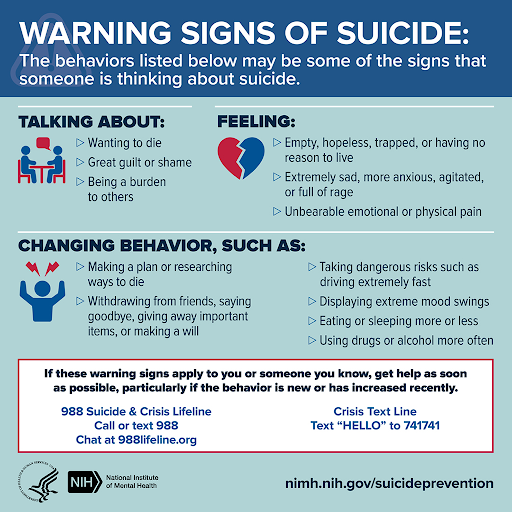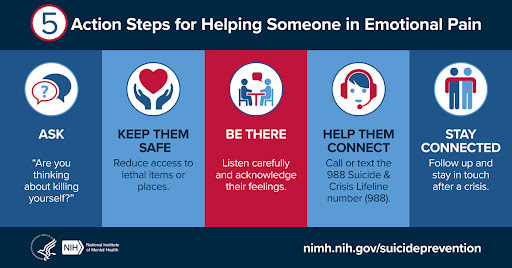Suicide is complicated and tragic, but it is often preventable. Knowing the warning signs for suicide and how to navigate conversations about suicide can help save lives.
Let's discuss a few common warning signs of suicide, the five steps for helping someone in emotional pain, and how Impact Fire supports its employees with these difficult conversations.
Common Suicide Warning Signs
Here are a few behaviors that may indicate someone is at risk for suicide.
- Giving away possessions
- Talking about a suicide plan
- Talking about not being present in the future
- Making direct statements about suicide
- Social media posts about death or suicide
- Asking about life insurance policy details, particularly related to cause of death
- Making statements that indicate hopelessness
- “Life is meaningless.”
- “I feel trapped/helpless/hopeless.”
- “You’d be better off without me.”
- “No one would miss me if I was gone.”
- “What’s the point in trying.”
- “I’m a burden to others.”

5 Steps for Helping Someone in Emotional Pain
Your employees may wonder how they can make a difference in suicide prevention. Here are five steps employees can take to help an individual in emotional pain.

1. Ask
The first step to helping someone in emotional pain is asking a direct question: “Are you thinking about suicide?” Other questions you can ask include:
- How can I help?
- How do you hurt?
By asking these questions, you communicate that you’re open to discussing suicide in a supportive and non-judgmental way. Being direct and unbiased opens the door for effective dialogue. Keep in mind that studies indicate that asking individuals if they are suicidal does not increase suicidal thoughts.
Here are a few things to avoid when talking to someone in emotional pain.
- Moralize or debate
- Pry into someone’s life
- Try to solve their problem
- Promise to keep their suicidal thoughts a secret
2. Keep Them Safe
Once you’ve determined an individual has suicidal tendencies, it’s essential to establish immediate safety. To gauge the imminence and severity of danger the person is in, consider the following questions:
- Do they have a detailed plan?
- What’s the timing for their plan?
- What access do they have to their planned method?
- Have they already done anything to try to kill themselves?
-
If a person is in imminent danger of self-harm, it is appropriate to contact the authorities to take over.
At this point, the main goal is to reduce access to means for suicide (weapons, medications, etc.). You want to put time and distance between the person and their chosen method. Why is means restriction necessary? Several studies have illustrated that when lethal means are made less available, suicide rates by that method decline.
3. Be There
This step is about being physically and emotionally present, which could mean talking with them on the phone or going for a long walk. After you ask a question, make sure to listen actively. Here are some tips.
- Ask open-ended questions
- Validate and be empathetic - take their answers seriously
- Listen or ask about their reasons for living and help them focus on those reasons
Increasing connectedness and limiting isolation for someone with thoughts of suicide can be life-saving. It’s important to ensure you follow through with your plans to support the person. Never commit to an activity you aren’t willing or able to accomplish.
4. Help Them Connect
You want to connect the individual to help as directly as possible at this stage. Consider the following questions when exploring possible support systems:
- Are they seeing a mental health professional currently?
- Have they in the past?
- Are there other mental health resources in the community?
One way to help an individual connect with ongoing support is to create a safety plan for moments of crisis. A safety plan can include:
- Reasons to live
- Ideas to calm down
- A list of individuals to contact when a crisis occurs (family member, friend, spiritual advisor, or mental health professional)
- Crisis hotline information
-
- National Suicide Prevention Lifeline number (1-800-273-TALK)
- The Crisis Text Line (741741)
5. Stay Connected
After a crisis, it’s necessary to follow up and see how the individual is doing. The follow-up step is an excellent opportunity to leave a message, send a text, give a call, and see if there is anything more you can help with. Studies have shown that following up, even simple things like sending a caring postcard, can reduce the risk of suicide.
How Impact Fire Supports Suicide Prevention
Impact Fire conducted a series of activities to support suicide prevention awareness. The engaging mental health event empowered employees and equipped them with the knowledge and tools to recognize, communicate, cope and regulate their emotions and mental health challenges. Investing in our employees' mental health enables them to flourish in their roles and reach their highest potential.
Here is a brief overview of our event:
Training Session for Leaders - Dr. Aaron Weiner, a board-certified Psychologist and addiction specialist, conducted a live training session for workplace leaders on suicide prevention and conversation strategies. The training session covered the dos and don'ts of talking about suicide, dealing with the aftermath of a suicide, best practices for cultivating mental health and social inclusion in the workplace, and more.
Training Session for Employees - Dr. Aaron Weiner conducted a similar live session for employees navigating conversations about suicide. The training session covered suicide prevalence statistics, suicide myths, common warning signs, steps for helping someone in emotional pain, and more. The session was recorded to give current, and future employees prolonged access to a helpful resource.
Monthly Safety Meeting - Focused on practical tools for anxiety and stress reduction. Check out the 60-minute educational video for more information.
An Impact Fire employee said this about the suicide prevention awareness event.
“The presentations were both terrific and provided valuable resources and support for a challenging topic. Once again, this company has gone above and beyond to bring topics to the table that are desperately needed, yet often pushed aside or swept under the rug with the mindset of “that won’t happen here”. I, from the bottom of my (sometimes jaded) heart, thank you for that. Impact Fire absolutely lives up to its name and makes a big IMPACT!”
Related Resource
IMPACT FIRE'S MENTAL HEALTH SUPPORT
Check out our expansive mental health resources for full-time Impact Fire employees.Learn More →
Supporting Suicide Prevention: A Long-Term Commitment
While mental health can be a difficult and uncomfortable topic to cover at work, companies must address suicide prevention for the betterment of their employees. At Impact Fire, we value our diverse group of talented and passionate fire and life safety professionals and prioritize mental health to promote sustained employee satisfaction, appreciation, and engagement.
We are proud of the success of our suicide prevention event and are excited to launch future initiatives. Individuals interested in joining the Impact Fire team should get in touch with us to learn more about how they can begin their unique fire and life safety journey.







